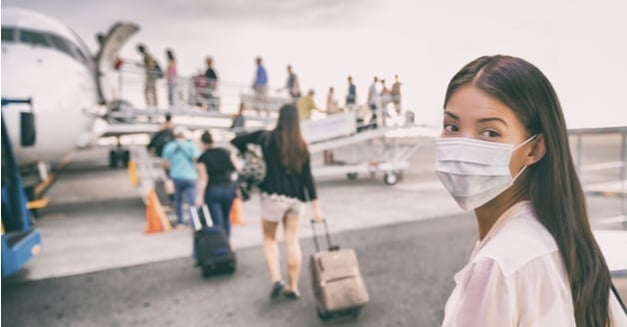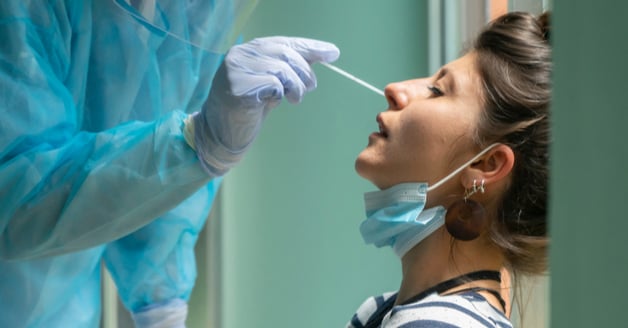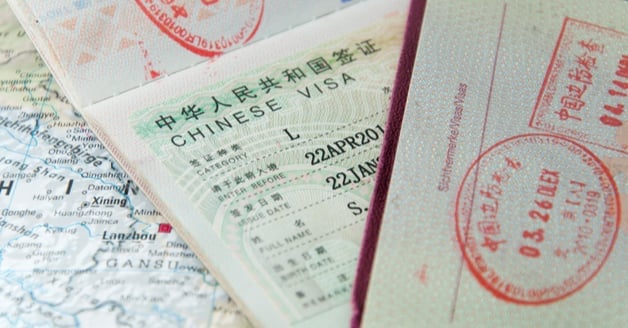
Following a strict closing of borders and travel ban on 28 March 2020 and a series of safety measures, Mainland China has managed to curb the spread of the pandemic. Prior to the updated policies, foreign nationals with a valid visa were not able to return to the country, and only those with visas issued after 28 March 2020 were permitted to enter the country.
As the country works towards returning to normal, foreigners are now able to return under certain circumstances and will be subject to strict health and safety protocols.
In this blog, we will break down the criteria for those eligible to enter China, the documents you will need to obtain, and quarantine measures after arriving in the country.
Foreigners With a Valid Residence Permit
Foreign nationals from 49 countries with a valid residence permit, including work permits, or family reunion permits, can now return to China with their existing visa. If you are a foreign nationals from any one of those countries, but your permits expired after 28 March 2020, you can re-apply for the same visa by providing your expired permits and any other relevant documents. However, you can only do this under the condition that your intent of visiting the country remains the same.
When applying for your visa, it is important to note that each embassy or consulate will be implementing different hours as per the country’s policies, for more information, please visit their websites.
If you are a foreign national from the following countries with a valid residence permit, you can now return to China:
European Countries
Albania, Austria, Belgium, Bosnia and Herzegovina, Bulgaria, Croatia, Cyprus, Czech Republic, Denmark, Estonia, Finland, France, Germany, Hungary, Iceland, Ireland, Italy, Latvia, Lithuania, Luxembourg, North Macedonia, Malta, Montenegro, Netherlands, Norway, Poland, Portugal, Romania, Serbia, Slovakia, Slovenia, Spain, Sweden, Switzerland, Greece, or the United Kingdom.
Asian Countries
Japan, South Korea, Malaysia, Indonesia, Thailand, Singapore, Brunei, Sri Lanka, Cambodia, Laos, Vietnam, Myanmar, or Democratic Republic of Timor-Leste.
Foreigners Without a Valid Residence Permit
If you are a foreign national without a valid residence permit, you are also allowed to enter the country, but only if you are travelling for any of the following purposes:
- Resuming operation and production for economic, trade, scientific or technological purposes;
- Visiting an immediate family member who is in critical medical condition and in need of care;
- Arranging a funeral of an immediate family member in China;
- Reuniting with spouse or parent (for children under the age of 18) of a Chinese citizen or Chinese Permanent Resident;
- Taking care of parents who are Chinese nationals;
- Accompanying your spouse and parents (for children under the age of 18) on their visit.
If you qualify for a crew visa (C visa), or a talent visa (R visa), you are also eligible to enter the country.
Documents Required
To apply for a visa without a valid residence permit, you will need to submit the following documents with your application:
- Obtain and submit an invitation letter – this can be from the Ministry of Foreign Affairs (MFA) or Ministry of Commerce, or relatives in China.
- Submit proof of relationship, for those visiting family in China.
- Submit related medical or death certificate, if applicable.
- Submit personal statement with an explanation of the situation, if applicable.
- For accompanying spouses or children, you will also need to provide proof of relationship.
COVID-19 Testing

Both foreign nationals and Chinese nationals travelling into China will be required to obtain an official negative COVID-19 test result within 5 days of boarding your flight. The nucleic acid tests must be conducted at facilities recognised by the Chinese embassies of the origin country. Upon arrival in China, all visitors will need to do a nucleic acid test again and wait for the results at the designated waiting location.
Quarantining in China
In order to facilitate a smoother travel process for essential and business travel, China has entered into agreements with multiple countries, to create a ‘travel bubble’. Depending on where you are coming from, you may be eligible to go through a fast-track procedure which will allow you to enter the country and have minimal to no quarantine period.
Normal Channel – 14 Day Quarantine
Foreign nationals from countries without a special travel arrangement with China will need to undergo the whole 14-day quarantine period.
In order to travel to China under the normal channel, you will need to go through the following process:
- Your company must apply for your trip at the district- or municipal-level MFA.
- If you are identified as an essential part of the business operations, the application will get forwarded to province-level MFA, and your company will be notified.
- The MFA will then issue a visa notification to the MFA and your local Chinese embassy or consulate. They will also send a hard copy to your company.
- You will need to obtain a copy of this from your company, and present it at your local Chinese embassy or consulate when applying for your visa.
- Upon receiving your visa, you will be able to take a flight to China. You will need to obtain a negative result for your nucleic acid test prior to your flight.
- Upon your arrival in the country, you will need to do a nucleic acid test again.
- If you appear to have any associated symptoms, you will be placed under further medical observation.
- If you do not have any of the symptoms, you will be directed to a designated waiting facility to wait for your results, which may take up to 24 hours.
- If your test result is negative, you will need to be quarantined at a designated location for 14 days.
- If positive, you will be taken for observation and treatment. The cost of your care will likely be absorbed by your company.
Fast-Track Channel – Closed Circuit
Foreign nationals from Germany, France, South Korea, UK, Japan, and Singapore, can benefit from a fast track arrangement with China. If you are a national from any of these countries, you can go through the shortened process as follows:
- Your company must apply for your visit at the province-level MFA, and submit a written statement detailing how they will comply with all the safety requirements during your trip.
- Upon approval, the MFA will then issue a visa notification to the MFA and your local Chinese embassy or consulate. They will also send a hard copy to your company.
- You will need to obtain a copy of this from your company, and present it at your local Chinese embassy or consulate when applying for your visa.
- Your local embassy will conduct a further review of your application based on the agreements your origin country has with China. The embassy will also check that you have not or will not travel to a high-risk country in the 14 days before your departure.
- Upon receiving your visa, you will be able to take a flight to China. You will need to obtain a negative result for your nucleic acid test prior to your flight, within the timeframe laid out in your origin country’s agreement with China.
- Upon your arrival in the country, you will need to do a nucleic acid test again, as well as an additional serological test, which will require a blood sample.
- If you appear to have any associated symptoms, you will be placed under further medical observation.
- If you do not have any of the symptoms, you will be directed to a designated waiting facility to wait for your results, which may take up to 24 hours.
- If your test result is negative, you will be allowed to work under the country’s safety requirements which restricts residence location, use of public transport, and imposes workplace regulations as well for 14 days.
- If positive, you will be taken for observation and treatment. The cost of your care will likely be absorbed by your company.
Getting Your New China Visa

The China visa process can get quite complicated, and the additional restrictions only make it more so, especially for those without a residence permit. For those looking to go to China during this period, you will need to be meticulous with your application to ensure a smooth process.
For a hassle-free experience, it is recommended that you seek some assistance from visa consultants. Hongda’s expert consultants can help you obtain invitation letters and navigate the bureaucracy of the application process.
If you're thinking about working in China, make sure to download our free comprehensive Work Visa for China Checklist!





